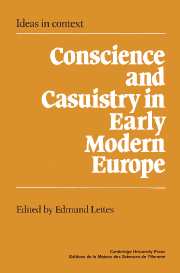Book contents
- Frontmatter
- Contents
- Notes on contributors
- Introduction
- 1 Governing conduct
- 2 Laxity and liberty in seventeenth-century English political thought
- 3 Casuistry and character
- 4 Prescription and reality
- 5 The ‘new art of lying’: equivocation, mental reservation, and casuistry
- 6 Kant and casuistry
- 7 Moral arithmetic: Seven Sins into Ten Commandments
- 8 Optics and sceptics: the philosophical foundations of Hobbes's political thought
- Index
6 - Kant and casuistry
Published online by Cambridge University Press: 13 October 2009
- Frontmatter
- Contents
- Notes on contributors
- Introduction
- 1 Governing conduct
- 2 Laxity and liberty in seventeenth-century English political thought
- 3 Casuistry and character
- 4 Prescription and reality
- 5 The ‘new art of lying’: equivocation, mental reservation, and casuistry
- 6 Kant and casuistry
- 7 Moral arithmetic: Seven Sins into Ten Commandments
- 8 Optics and sceptics: the philosophical foundations of Hobbes's political thought
- Index
Summary
GONE OUT OF FASHION
Towards the end of the eighteenth century, casuistry, which is so inseparably connected with the history of the Jesuit Order in Protestant and Enlightenment polemics, appears to have gone out of fashion completely. As early as 1733, Zedler's Universal-Lexikon contained only a short entry on casuists: ‘Casuists are a kind of learned persons who investigate confused cases and scruples of conscience and present explications of the same in their writings.’ In the article on probabilists (1741) in the same lexicon we read: ‘This is the name given to those Roman casuists who say that in deciding a question of conscience one can follow an opinion that is not probable and not certain.’ This is then relativized by the additional remark that even among the Jesuits the view was held that one ought ‘always to follow the most probable and most certain opinion’; moreover, Pope Innocent XI had expressly condemned genuine probabilism in 1679. A new German translation of Blaise Pascal's Provincial Letters published in 1773 justified itself by extending the concept ‘Jesuit’ in enlightened polemic: although the curtain is coming down on the Society of Jesus, which has played out its part in the world, nonetheless ‘there are still too many Jesuits in the world for one to consider this Order to be exterminated – even if some are Protestant Jesuits’. Those who rely on casuistry and probabilism are thus simply following an antiquated model of conduct.
- Type
- Chapter
- Information
- Conscience and Casuistry in Early Modern Europe , pp. 185 - 213Publisher: Cambridge University PressPrint publication year: 1988
- 8
- Cited by



